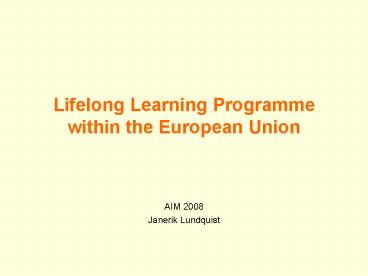Lifelong Learning Programme within the European Union - PowerPoint PPT Presentation
1 / 19
Title:
Lifelong Learning Programme within the European Union
Description:
The European Commission has integrated its various educational and training ... It caters not only for students, but also for profes-sors who want to teach ... – PowerPoint PPT presentation
Number of Views:200
Avg rating:3.0/5.0
Title: Lifelong Learning Programme within the European Union
1
Lifelong Learning Programmewithin the European
Union
- AIM 2008
- Janerik Lundquist
2
EHEA Pillar Stones
- Transparency
- Mutual trust
- Make diversities visible
3
Lifelong Learning Programme
- The European Commission has integrated its
various educational and training initia-tives
under a single umbrella, the - Lifelong Learning Programme
- with a budget of nearly 7 billion for 2007 to
2013. The new programme replaces previous
education, vocational training and e-Learning
programmes, which ended in 2006.
4
Lifelong Learning Programme
- The programme enables individuals at all
stages of their lives to pursue stimulating
learning opportunities across Europe. - There are four sub-programmes focusing on
different stages of education and training and
continuing previous programmes
5
Comenius for schools Erasmus for higher
education Grundtvig for adult education
Leonardo da Vinci for vocationaleducation and
training
- Lifelong Learning Sub-Programmes
6
ERASMUS
- Erasmus is the EU's flagship education and
training programme, enabling 200 000 thousand
students to study and work abroad each year, as
well as supporting co-operation actions between
higher education institutions across Europe. It
caters not only for students, but also for
profes-sors who want to teach abroad and for
university staff who want to be trained abroad.
In addition to mobility actions, the Programme
supports higher education institutions to work
together through intensive programmes, networks
and multilateral projects.
7
ERASMUS
- The Programme seeks to expand its mobility
actions even further in coming years, with the
target of 3 million Erasmus students by 2012.
8
ERASMUS
- For students
- studying abroad
- working abroad (placements)
- linguistic preparation
- For university staff
- teaching abroad
- receiving training abroad
9
ERASMUS
- For universities/ higher education institutes
- intensive programmes
- academic and structural networks
- multilateral projects
- For enterprises
- student placements
- teaching abroad
- university cooperation
10
Transversal Programme
- In order to ensure that the four sub-programmes
of the Lifelong Learning Programme reach the best
results, a transversal programme with four key
activities complements them. - Policy co-operation - Innovating and sharing good
policy practices - Languages - Breaking the language barriers
- Information and communication technologies -
Innovative learning - Dissemination and exploitation of project results
- Spreading and implementing the results
11
Information and Communications Technologies (ICT)
- Effective integration of ICT into education
must go beyond simply replacing, streamlining or
accelerating current practices. It must also find
new and more effective ways of operating,
supporting pedagogical and organisational
innovation. ICT has become embedded in our social
and economic fabric and it should be similarly
embedded in education and training systems.
12
External Relations Programmes
- Tempus
- Erasmus Mundus
- Co-operation with Industrial Countries
13
Tempus Modernising higher education
- Tempus (The Trans-European Mobility Scheme for
University Studies) supports the modernisation of
higher education and creates an area of
co-operation in countries surrounding the EU.
Established in 1990, after the fall of the Berlin
Wall, the scheme now covers 27 countries in the
Western Balkans, Eastern Europe and Central Asia,
North Africa and the Middle East.
14
Tempus Modernising higher education
- Tempus finances two types of actions
- Joint Projects are based on multilateral
partnerships between higher education
institutions in the EU and the partner countries.
They can develop, modernise and disseminate new
curricula, teaching methods or materials, boost a
quality assurance culture, and modernise the
management and governance of higher education
institutions. - Structural Measures contribute to the development
and reform of higher education institutions and
systems in partner countries, to enhance their
quality and relevance, and increase their
convergence with EU developments.
15
Erasmus Mundus
- Erasmus Mundus is a co-operation and mobility
programme in the field of higher education which
promotes the European Union as a worldwide centre
of excellence in learning. - The programme supports European top-quality
Masters courses and enhances the visibility and
attractiveness of European higher education in
third countries. It also provides EU-funded
scholarships for third-country nationals
participa-ting in these Masters courses, as well
as for EU-nationals studying at partner
universities around the world.
16
Erasmus Mundus External Cooperation Window
- The Erasmus Mundus External Co-operation
Window (EM ECW) objective is to achieve better
understanding and mutual enrichment between the
European Union and third countries co-operation
in the field of higher education through
promoting the exchange of persons, knowledge and
skills at higher education level. This will be
achieved through the promotion of partnerships
and institutional co-operation exchanges between
European Higher Education Institutions and Third
Country institu-tions and a mobility scheme
addressing student and academic exchanges.
17
Co-operation with industrialised countries a
win-win situation
- Co-operation with industrialised countries
enhances the quality of higher education and
vocational training, as well as promo-ting
intercultural understanding. The EU has set up
joint study programmes with other industrialised
countries, to provide financial support for
student mobility.
18
Co-operation with industrialised countries a
win-win situation
- In 1995, the Commission made first formal
agreements with the U.S. and Canada on balanced
co-operation in higher education and vocational
training, which were renewed in 2006 to provide a
legal framework until 2013. Compared to previous
agreements, funds have been considerably
increased to consolidate and expand
trans-atlantic education co-operation.In
addition, several initiatives operate with other
industrialised countries, notably Australia,
Japan, New Zealand and South Korea.
19
Co-operation with industrialised countries a
win-win situation
- The main activities are
- Joint/ double degree projects
- Joint mobility projects
- Policy oriented dialogue and projects































